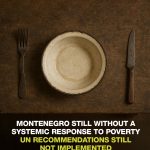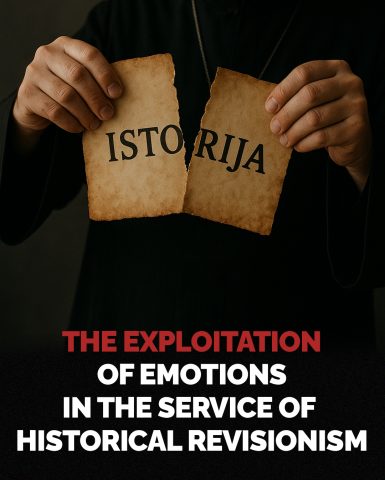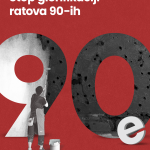
END POLITICAL GAME-PLAYING OVER THE CONSTITUTIONAL COURT
15/10/2025
MONTENEGRO STILL WITHOUT A SYSTEMIC RESPONSE TO POVERTY – UN RECOMMENDATIONS STILL NOT IMPLEMENTED
17/10/2025THE EXPLOITATION OF EMOTIONS IN THE SERVICE OF HISTORICAL REVISIONISM

Civil society organizations and civic activists warn the public about the dangers of historical revisionism through emotional and symbolic manipulation, the most recent example of which is the memorial service held for Chetnik fighters at Krnovo. Citizens are being misled through manipulative techniques that distort facts, suppress historical context, and exploit religious and national symbols. The goal is to mythologize the Chetnik forces as “innocent victims of atrocities,” contrary to historical facts that this was an armed battle involving fighters who died fighting on the side of fascist and Nazi occupiers.
We particularly condemn the institutional support for this process of historical denial, demonstrated by the presence of state officials.
On Sunday, October 12, a memorial service (parastos) was held for Chetniks at the site of Lobanja glava in Krnovo, organized by the association Kosovski božur od Nikšića and conducted by the Serbian Orthodox Church. The service was attended by the President of the Parliament of Montenegro, Andrija Mandić, which is reprehensible, as he represents the state of Montenegro and, by his attendance, endorses gatherings that distort the history of the state and insult the victims of fascist terror. Based on the speeches given, the impression was created that unarmed young men were executed at this site, while it was completely omitted that Krnovo was, in fact, the scene of an armed battle between Partisans (fighters of the National Liberation Movement) and armed Chetniks under Pavle Đurišić, who were part of occupying forces under German command.
With the holding of the parastos and the presence and speech of a high-ranking state official, shameless efforts continue to manipulate public opinion into accepting the rehabilitation of the Chetnik movement, which was responsible for some of the most brutal crimes against civilians and for collaborating with foreign fascist and Nazi occupiers.
During the service, manipulative rhetorical techniques were deliberately used—especially highly emotional language. Phrases like “barefaced young men,” “innocent victims,” “killed boys,” “without trial or verdict,” “dog cemeteries,” and “graves unknown” were employed to create the impression that the individuals were innocent victims. This emotional instrumentalization serves to bypass the complexity of historical facts and influence citizens through feelings rather than analytical understanding.
The omission of historical context relativizes the role and responsibility of the Chetniks, who committed mass crimes. Despite well-documented historical records, supporters of this harmful ideology—from both the government and the Serbian Orthodox Church (SPC)—continue to support the defeated Chetnik project and deny the facts. The Chetniks also committed crimes against Serbs who joined the Partisans or refused to cooperate with the Chetniks, contradicting the claim that they “defended the Serbian people.” This intra-ethnic violence is clear evidence of the political, not national, motives of the Chetnik movement. Yet, through fabricated sentimental myths, well-known facts are denied.
The visual setup also serves manipulative purposes. The use of Serbian flags and religious symbols (such as the cross) aims to equate the Serbian people with the Chetniks, which is unacceptable and damaging to the Serbian people, who are unjustly identified with the war crimes committed by the Chetniks.
The presence of a high-ranking Montenegrin official at a revisionist event attempts to legitimize the unacceptable—the recasting of the shameful history of the Chetnik movement. At the same time, religion and the church are misused as moral authorities to rally support for this project.
As the Antifascists of Cetinje stated: the Chetniks of Pavle Đurišić and the Eighth “Iron” Regiment fought side by side with the notorious SS Division “Prinz Eugen”, the same unit that committed the Velika massacre only ten days earlier and ravaged Piva a year prior. At Krnovo, these same Chetniks helped the Nazis push back into Piva. These facts are documented in Partisan, Chetnik, and German sources and are available in archives and published document collections.
Although the Montenegrin Parliament adopted a Resolution on the Genocide in Piva and Velika three years ago, condemning those crimes, the current Speaker of Parliament now seeks to erect a monument or “temple” to some of their perpetrators. These efforts to forcibly reshape public memory are only possible because all the coalition partners forming the government—including PES, the Democrats, the Bosniak Party, and Albanian parties—remain silent on the already erected revisionist monuments and on demands to build new ones.
We reaffirm our strong opposition to the attempts to erect monuments 80 years after WWII in honor of lost Chetnik battles and defeated ideas of ethnically pure territories. The Chetnik movement never aimed for freedom and equality for all citizens of Yugoslavia—not even according to the biased interpretations of its supporters—but for the domination of one ethnic group over all others. For this reason, public glorification of their leaders is completely unacceptable.
Antifascism is a universalist concept, free from ethnic exclusivity, while the Chetnik ideology promoted notorious ethnic cleansing, as recorded in their official programmatic documents (e.g., “Homogeneous Serbia” by Stevan Moljević).
Chetnik crimes were not isolated incidents, but part of a deliberate policy, as evidenced in Chetnik directives that called for the extermination of “non-Orthodox” populations. Moreover, Chetniks repeatedly collaborated with Nazi and fascist occupiers against the Partisans, betraying the ideals of resistance and freedom—another reason why all attempts at their public glorification must be firmly and unequivocally rejected.
Signed by:
- Dina Bajramspahić, Civic Activist
- Paula Petričević, Civic Activist
- Filip Kuzman, Antifascists of Cetinje
- Miloš Vukanović, Association of History Teachers of Montenegro – HIPMONT
- Tea Gorjanc Prelević, Human Rights Action (HRA)
- Daliborka Uljarević, Centre for Civic Education (CGO)
- Ervina Dabižinović, Center for Women’s and Peace Education ANIMA
- Milena Popović Samardžić, NGO Ipso Facto
- Maja Raičević, Women’s Rights Centre (WRC)
- Velija Murić, Montenegrin Committee of Lawyers for the Protection of Human Rights
- Jovana Marović, Civic Activist
- Demir Ličina, Association “Štrpci – Against Oblivion”
- Milica Kovačević, Center for Democratic Transition (CDT)
- Nevenka Vuksanović, Center for Democracy and Human Rights (CEDEM)
- Milka Tadić Mijović, Center for Investigative Journalism (CIN CG)
- Zlatko Vujović, Center for Monitoring and Research (CEMI)
- Olivera Nikolić, Media Institute
- Zorana Marković, Center for Development of NGOs (CRNVO)
- Ivana Vojvodić, Juventas
- Aida Perović, PRIMA
- Jovan Ulićević, Spektra Association
- Staša Baštrica, KVIR Montenegro
- Ana Dedivanović, Stana
- Slavica Striković, Women’s Action
- Milica Kankaraš Berber, Artist and Activist
- Dušan Pajović, Civic Activist
- Nikoleta Đukanović, Civic Activist
- Milena Bešić, Civic Activist
- Aleksandar Saša Zeković, Civic Activist
- Sabina Talović, Civic Activist
- Almedina Dodić, Eduko Plus







 English
English